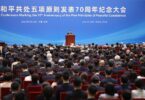Prime Minister Shehbaz Sharif’s recent visit to China marks a significant milestone in strengthening the economic ties between Pakistan and China. The trip, encompassing meetings with key Chinese financial and technological stakeholders, underscores the strategic importance of the China-Pakistan Economic Corridor (CPEC) and the broader bilateral relationship. This editorial will appreciate the trip’s importance, its benefits, and how Pakistan can leverage its relationship with China to boost its economic prospects.
During his visit, Prime Minister Sharif met with Dr. Wu Fulin, President of China Exim Bank, in Beijing. The discussions revolved around enhancing governance, expanding the tax net, and ensuring ease of doing business in Pakistan to attract foreign direct investment (FDI). The prime minister highlighted that these reforms had already yielded positive results, notably controlling inflation in the food sector, narrowing the current account deficit, and bringing public debt to a more sustainable level. These are significant achievements for Pakistan, providing a solid foundation for attracting more Chinese investment.
One of the most anticipated aspects of the visit was the potential inauguration of the second phase of the CPEC project. The CPEC, a flagship initiative under China’s Belt and Road Initiative, has already brought substantial investments to Pakistan, improving infrastructure and creating jobs. The second phase promises to further integrate the economies of the two nations, fostering greater trade and investment opportunities.
Prime Minister Sharif’s emphasis on business-to-business cooperation between Pakistan and China is a forward-thinking approach. By inviting technology giant Huawei to invest in Pakistan’s taxation and e-governance sectors, the prime minister aims to modernize and streamline these critical areas. Huawei’s involvement in Safe City projects across Pakistan further highlights the potential for enhanced security and technological advancement. The signing of 32 memorandums of understanding (MoUs) between the two nations during this visit underscores the commitment to deepening economic ties and fostering a robust investment climate.
The upgradation of the Main Line-1 (ML-1) cross-country rail line is another significant project ready for investment. This project, along with the revival of the Karachi Circular Railway, symbolizes Pakistan’s commitment to improving its transportation infrastructure. By learning from China’s expertise in agriculture, Pakistan can also enhance its agricultural productivity, ensuring food security and economic stability.
The meeting between Prime Minister Sharif and China International Development Cooperation Agency (CIDCA) Chairman Luo Zhaohui further highlighted the importance of the ML-1 project. China’s continued support for the modernization of Pakistan’s industries, agriculture, and IT sectors is crucial for the country’s development. The strategic partnership between China Exim Bank and Pakistan, particularly under CPEC Phase II, is expected to boost Pakistan’s exports in international markets, fostering economic growth and stability.
The benefits of Prime Minister Sharif’s trip to China are manifold. Firstly, the visit has strengthened the strategic partnership between Pakistan and China, ensuring continued support for critical development projects. Secondly, it has opened new avenues for investment in key sectors such as transportation, agriculture, and technology. These investments will create jobs, improve infrastructure, and enhance productivity, contributing to Pakistan’s economic growth.
Moreover, the focus on modernizing governance and expanding the tax net will create a more business-friendly environment in Pakistan. This, in turn, will attract more FDI, boosting the economy and creating more opportunities for the Pakistani people. By leveraging China’s expertise and investment, Pakistan can enhance its agricultural productivity, ensuring food security and reducing poverty.
The collaboration between Pakistan and China under CPEC Phase II is particularly promising. This phase focuses on industrial cooperation, socio-economic development, and agricultural modernization, which are critical for Pakistan’s long-term economic stability. By fostering closer ties with China, Pakistan can access new markets, enhance its technological capabilities, and build a more resilient economy.
In conclusion, Prime Minister Shehbaz Sharif’s visit to China is a significant step towards enhancing Pakistan’s economic prospects. The trip has reinforced the strategic partnership between the two nations, opened new investment opportunities, and laid the groundwork for sustained economic growth. By continuing to improve governance, expand the tax net, and ensure ease of doing business, Pakistan can attract more FDI and leverage its relationship with China to build a prosperous future. The benefits of this collaboration are immense, promising a brighter, more stable economic future for Pakistan.







